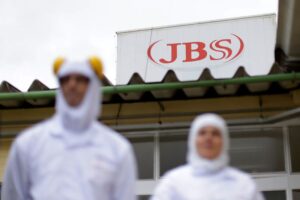JBS SA Moves Closer to U.S. Listing: What Investors Need to Know
In a significant development for the investor community, JBS SA, the world’s largest meat-packing company, has taken crucial steps towards a primary listing of its shares on the New York Stock Exchange (NYSE). This move, hinted at through a recent regulatory document filed with the U.S. Securities and Exchange Commission (SEC), is poised to reshape JBS’s market landscape and present new opportunities for shareholders.
The Path to NYSE: Timeline and Expectations
JBS has long sought to establish a dual listing, which would enable trading of its shares not just in Brazil but also in the United States. According to the filing, the company’s board of directors is expected to meet as early as April 22 to discuss the proposal for a general meeting with shareholders regarding the dual listing. This meeting is tentatively scheduled for May 23, with trading of JBS shares anticipated to commence in New York around June 12.
This timeline, while promising, is still contingent on regulatory approvals. Analysts, such as Igor Guedes from Genial Investimentos, note that while these dates signal a proactive approach from JBS, the final schedule will ultimately depend on the SEC’s actions.
Implications for Investors
Gaining a primary listing on the NYSE opens up JBS to a broader pool of investors, which can significantly influence the company’s valuation. Currently, JBS is mainly traded in Brazil, where market conditions and investor interest can differ markedly from those in the U.S. By entering the NYSE, JBS aims to align its valuation more closely with industry peers who have access to U.S. capital markets, potentially enhancing liquidity and attracting larger institutional investors.
Moreover, the addition of U.S. trading means that JBS will issue Brazilian depositary receipts (BDRs) for its shares, effectively offering a greater array of investment tools for U.S. investors interested in gaining exposure to the Brazilian slaughter and meat-packing sector.
Key Stakeholder Dynamics
A notable development in the lead-up to the shareholders’ meeting is the announcement from BNDESPar, the equity arm of Brazil’s development bank and JBS’s second-largest shareholder, that it intends to abstain from voting on the dual listing. This decision alleviated some uncertainty regarding BNDESPar’s potential opposition, which had previously hung over the company’s stock performance. The positive reaction on the stock market reflects the importance of institutional confidence in JBS’s strategic direction.
What’s Next for JBS?
While the enthusiasm from stakeholders is palpable, it’s essential for investors to remain cautious. Any plans are still subject to SEC scrutiny, which requires JBS to submit a Form F-4 registration for securities as a foreign private issuer. The final approval will play a critical role in determining the feasibility of the proposed timeline.
JBS’s move towards a U.S. listing is not just a strategic pivot; it represents a broader trend of globalization in the food and agriculture sectors. As companies seek access to diverse financial markets, the implications for investment strategies are profound. Investors should keep an eye on future announcements and regulatory updates, not just from JBS but across the industry as the market landscape continues evolving.
In conclusion, the journey of JBS towards a dual listing marks an exciting chapter for investors looking to diversify their portfolios. As this development unfolds, engaging with resources that offer timely insights and expert analysis, like Extreme Investor Network, will be crucial for making informed investment decisions. Be sure to stay tuned for updates and analysis as this story develops!

